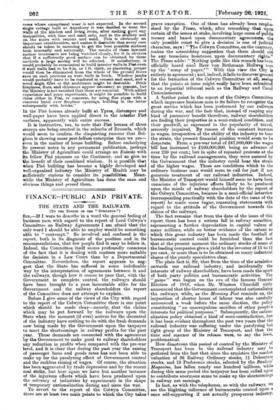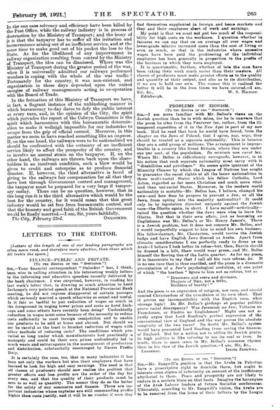FINANCE—PUBLIC AND PRIVATE.
THE STATE AND THE RAILWAYS.
(To "Hz EDITOL 07 SPEOTATOR."] Six,-If I were to describe in a word the general feeling of business men with regard to the report of Lord Colwyn's Committee on Railway Agreements I am afraid that the only word I should be able to employ would be something akin to " contempt." So involved and confused is the report, both in its diagnosis of the position and in. its recommendations, that few people find it easy to follow it. Indeed, the Committee itself seems profoundly conscious. of the fact that it is dealing with matters more suitable for decision in a Law Court than by a Departmental Committee. Nevertheless, the report appears to Bog. gest that the State has suffered in some indefinable way by the interpretation of agreements between it and the, railways, though how it conies to pass that, with the Government in complete control, the railways should, have been brought to a pass lamentable alike for the Government and the railway shareholders the report of the Committee does not attempt to explain..
Before I give some of the views of the City with regard to the report. of the Colwyn Committee there is one point which should be made clear—namely, that the claims which, may be put forward by the railways upon, the State when the moment. (if ever) arrives for the decontrol of the industry have nothing to do with the fresh demands now being made by the Government upon the taxpayer to meet the shortcomings in railway profits for the 'past year. Those demands are connected with the agreement by the Government to make good to railway shareholders any reduction in profits when compared with the pre-war level, and it. is clear that during the peat year the raising. of passenger fares and goods rates has not been able to make up for the paralysing effect of Government control and the reckless raising, of wages. Of course, the situation has been aggravated by trade depression and by the recent coal strike, but here again we have bat another instance of the injurious effects which have been produced upon the solvency of industries by experiments in the shape of temporary nationalization during and since the war. To revert to the report of the Colwyn Committee, there are at least two main points to which the City takes grave exception. One of these has already been empha, sized by the Times, which, after remarking that upon certain of the issues at stake, involving large sums of public money and based upon documentary agreements, the only possible court to give a decision is one of judicial character, says: " The Colwyn Committee, on the contrary, makes the astonishing suggestion- that there should' not be any tenacious insistence upon documentary rights.' The Times adds : " Nothing quite like this remark has been officially heard since Herr von Bethmann Hollweg tore up the scrap of paper." With this view the City jail entirely in agreement; and, indeed, it fails to discover ground for the formation of the Colwyn Committee at all, seeing that the points at issue might easily have been submitted to an impartial tribunal such as the Railway and Canal Commissioners.
A further point in the report of the Colwyn Committee which impresses business, men is its failure to recognize the great service which has been performed by our railways during the war, and the fact that, instead of reaping any kind of pecuniary benefit therefrom, railway shareholders are finding their properties in a semi,ruined condition, and their goodwill, as expressed in the popularity of travel, seriously impaired. By reason of the constant increase in wages, irrespective of the ability of the industry to bear the strain, the present financial position. would seem to be desperate. Prom a pre-war total of £47,000,000 the wages bill has increased to £160,000,000, being an advance of over 230 per cent.; but in spite of repeated protests at the time by the railroad managements, they were assured by the Government that the industry could bear the strain of the higher wages. These are conditions which to the ordinary business man would seem to call for just if not generous treatment of our railroad industries. Indeed, the Minister of Transport would himself-seem to have been conscious of the injurious effects likely to be produced upon the minds of railway shareholders by the report of the Colwyn Committee, because in a semi-official interview (corresponding practically with the date of the issue of the report) he made some vague, reassuring statements with regard to the attitude of the Government towards the claims of the railways.
The fact remains that from the date of the issue of this report there has been a serious fall in railway securities, representing a .further depreciation in capital values of many millions, while no better evidence of the extent to which this great industry has been made the football of bureaucratic control• could be furnished than the fact that at-the present moment the ordinary stocks, of some of the leading companies give a yield to the,investor of 11 to 12 per cent., or more than is to be obtained on many industrial shares of the purely speculative class. The plain fact is, Sir, that from the time of the armistice onwards our railroad industry, and incidentally the interests of railway shareholders, have been made the sport of both party politics and bureaucratic activities. The " game " was begun on the ever of the famous General Election of 1918, when Mr. Winston Churchill airily announced that the Government contemplated nationalizing the railways, while, as the Morning Post reminds us, the imposition of shorter, hours of labour was also carefully announced a week before the same election, the policy constituting " an unscrupulous sacrifice of other people's interests for political purposes." Subsequently, the nation- alization policy obtained a kind of semi-contradiction, but it has been evident throughout the past two years that the railroad industry was suffering under the paralysing but tight grasp• of the Ministry- of Transport, and that the time and manner of its release were, to say the least, problematical. How disastrous this period of control by the Ministry of Transport has been to the railroad industry may be gathered from the fact that since- the armistice the market valuation of 26 Railway Ordinary stocks, 11 Debenture stocks, and 13 Preference stocks, selected by the Bankers' Magazine, has fallen nearly one hundred millions, while during this same period the taxpayer has been called upon to contribute enormous sums to make up the shortcomings in railway net earnings. In fact, as with the telephones, so with the railways, we see the blighting influence of bureaucratic control upon a once self-supporting if not actually prosperous industry. in the one case solvency and efficiency have been killed'by the Tot Office, while the railway industry is in process of destruction by the Ministry of Transport; and the irony of it is that the taxpayer has to suffer all the irritation and inconvenience arising out of an inefficient service, and at the same time to make good out of his pocket the loss to the state. As for the likelihood of any improvement in railway organization resulting from control _by the Ministry of Transport, the idea can be dismissed. Where was the Ministry of Transport during the greater period of the war, when it •is universally admitted our railways performed wonders in coping with the whole of the war traffic ? Fortunately for the country, it was non-existent, and organisation in those days depended upon the united energies of railway managements acting in co-operation with the Board of Trade.
In the formation .of this Ministry of Transport we have, in 'fad, a flagrant instance of the unblushing manlier in which bureaucracy to-day dares to defy the public interest at every turn, and, in the opinion of the City, the spirit which pervades the report of the Colwyn Committee is the spirit which harmonizes with this bureaucratic determin- ation to make it wellnigh impossible for our industries to escape from the grip of official control. Moreover, in this matter' e teem to have reached something like an impasse. If, on the one hand, the railways were to he nationalized we should be confronted with the certainty of an inefficient service likely to affect the prosperity of the country, and to involve an annual strain on the taxpayer. If, on the other hand, the railways are thrown back upon the share- holders in an insolvent condition, such a blow would be given to credit and enterprise as to produce financial disaster. If, however, the third alternative is faced of giving to the railways fair compensation for all that they have lost through Government coiitrol and management, the taxpayer must be prepared for a very large if tempor- ary outlay. There can be no question, however, that in the long runtit is the third alternative which would be the best for the country, for it 'would mean that this great industry would be set free from bureatteratio control, and that the honesty and good faith of the British Government would lye finally asserted.—I am,'Sir, yours faithfully,



































 Previous page
Previous page